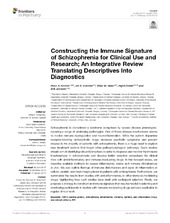Constructing the immune signature of schizophrenia for clinical use and research; an integrative review translating descriptives into diagnostics
Peer reviewed, Journal article
Published version

Åpne
Permanent lenke
https://hdl.handle.net/1956/23813Utgivelsesdato
2019Metadata
Vis full innførselSamlinger
Originalversjon
https://doi.org/10.3389/fpsyt.2018.00753Sammendrag
Schizophrenia is considered a syndrome comprised by several disease phenotypes, covering a range of underlying pathologies. One of these disease mechanisms seems to involve immune dysregulation and neuroinflammation. While the current dopamine receptor-blocking antipsychotic drugs decrease psychotic symptoms and prevent relapse in the majority of patients with schizophrenia, there is a huge need to explore new treatment options that target other pathophysiological pathways. Such studies should aim at identifying robust biomarkers in order to diagnose and monitor the immune biophenotype in schizophrenia and develop better selection procedures for clinical trials with anti-inflammatory and immune-modulating drugs. In this focused review, we describe available methods to assess inflammatory status and immune disturbances in vivo. We also outline findings of immune disturbances and signs of inflammation at cellular, protein, and brain imaging levels in patients with schizophrenia. Furthermore, we summarize the results from studies with anti-inflammatory or other immune-modulating drugs, highlighting how such studies have dealt with participant selection. Finally, we propose a strategy to construct an immune signature that may be helpful in selecting and monitoring participants in studies with immune modulating drugs and also applicable in regular clinical work.
